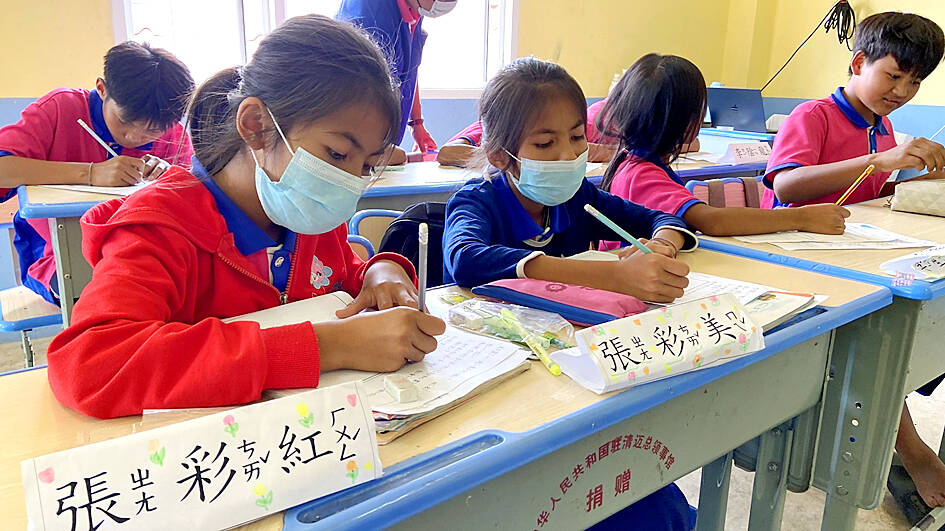The Test of Chinese as a Foreign Language (TOCFL) last year saw record-high numbers of examinees and sessions being held, highlighting the government’s efforts to promote Mandarin Chinese education overseas.
The test was administered more than 100,000 times, with 632 sessions being held in 47 countries, the Steering Committee for the Test of Proficiency-Huayu said in a statement yesterday.
The test is an important part of the government’s Chinese education for foreigners policy and serves as an excellent test to gauge students’ Chinese-language skills, it said.

Photo: CNA
Commissioned by the Ministry of Education, National Taiwan Normal University started the TOCFL program in 2005, committee head CEO Chen Po-hsi (陳柏熹) said.
To date, more than 740,000 tests have been administered, with Vietnamese accounting for the majority at 49 percent, he said.
Indonesians came in second at 12.2 percent and Japanese were third at 8.8 percent, he said.
The exam is available in more than 120 countries, with students accounting for the majority of examinees at 86.7 percent, the committee said.
People aged 21 to 30 comprised 49.4 percent of the test-takers, while examinees under the age of 20 accounted for 38.9 percent, it said.
The deadline for applications to take part in the examination next month is on Thursday next week, it said.
To encourage balanced learning of Chinese Mandarin, those taking the written, oral and audio-comprehension exams in one sitting can enjoy a 20 percent discount on exam fees, the committee said.

WAITING GAME: The US has so far only offered a ‘best rate tariff,’ which officials assume is about 15 percent, the same as Japan, a person familiar with the matter said Taiwan and the US have completed “technical consultations” regarding tariffs and a finalized rate is expected to be released soon, Executive Yuan spokeswoman Michelle Lee (李慧芝) told a news conference yesterday, as a 90-day pause on US President Donald Trump’s “reciprocal” tariffs is set to expire today. The two countries have reached a “certain degree of consensus” on issues such as tariffs, nontariff trade barriers, trade facilitation, supply chain resilience and economic security, Lee said. They also discussed opportunities for cooperation, investment and procurement, she said. A joint statement is still being negotiated and would be released once the US government has made

NEW GEAR: On top of the new Tien Kung IV air defense missiles, the military is expected to place orders for a new combat vehicle next year for delivery in 2028 Mass production of Tien Kung IV (Sky Bow IV) missiles is expected to start next year, with plans to order 122 pods, the Ministry of National Defense’s (MND) latest list of regulated military material showed. The document said that the armed forces would obtain 46 pods of the air defense missiles next year and 76 pods the year after that. The Tien Kung IV is designed to intercept cruise missiles and ballistic missiles to an altitude of 70km, compared with the 60km maximum altitude achieved by the Missile Segment Enhancement variant of PAC-3 systems. A defense source said yesterday that the number of

Taiwanese exports to the US are to be subject to a 20 percent tariff starting on Thursday next week, according to an executive order signed by US President Donald Trump yesterday. The 20 percent levy was the same as the tariffs imposed on Vietnam, Sri Lanka and Bangladesh by Trump. It was higher than the tariffs imposed on Japan, South Korea and the EU (15 percent), as well as those on the Philippines (19 percent). A Taiwan official with knowledge of the matter said it is a "phased" tariff rate, and negotiations would continue. "Once negotiations conclude, Taiwan will obtain a better

FLOOD RECOVERY: “Post-Typhoon Danas reconstruction special act” is expected to be approved on Thursday, the premier said, adding the flood control in affected areas would be prioritized About 200cm of rainfall fell in parts of southern Taiwan from Monday last week to 9am yesterday, the Central Weather Administration (CWA) said. Kaohsiung’s Taoyuan District (桃源) saw total rainfall of 2,205mm, while Pingtung County’s Sandimen Township (三地門) had 2,060.5mm and Tainan’s Nanhua District (南化) 1,833mm, according to CWA data. Meanwhile, Alishan (阿里山) in Chiayi County saw 1,688mm of accumulated rain and Yunlin County’s Caoling (草嶺) had 1,025mm. The Pingtung County Government said that 831 local residents have been pre-emptively evacuated from mountainous areas. A total of 576 are staying with relatives in low-lying areas, while the other 255 are in shelters. CWA forecaster